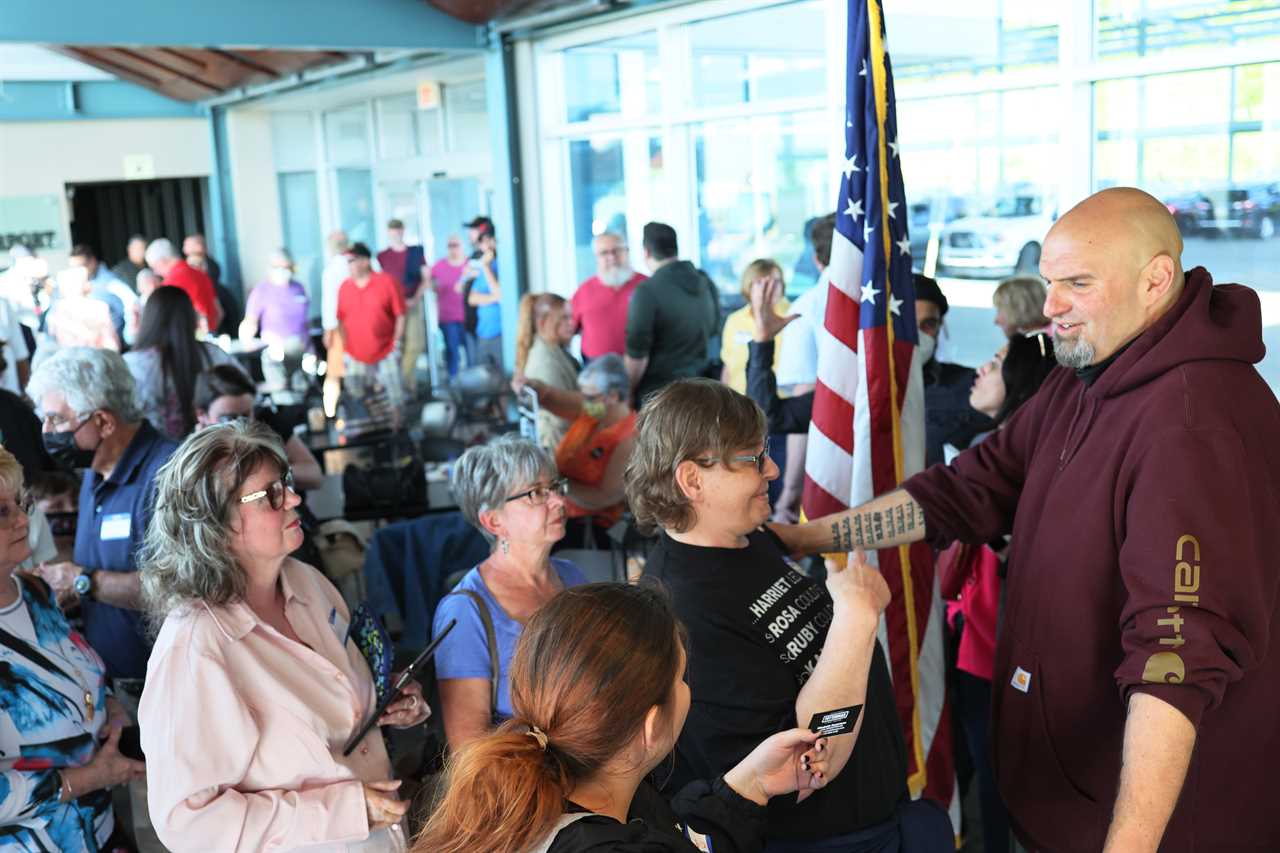
LANCASTER, Pa. — Few Senate candidates sell campaign T-shirts emblazoned with marijuana leaves.
But head over to Pennsylvania Lt. Gov. John Fetterman’s website, or drop by one of his rallies, and that’s what you’ll find.
“It’s high time that we get our sh*t together and legalize weed in PA + USA. More justice, jobs, revenue, and freedom,” the top-selling T-shirt’s description reads.
Fetterman is arguably the nation’s most outspoken pro-weed politician. He supported legalization as mayor of Braddock, Pa., and during his unsuccessful 2016 Senate campaign. In 2019, as the state’s second-in-command, he held a statewide listening tour on recreational cannabis legalization.
Now, with a wide polling lead on opponents in the Democratic primary — despite suffering a stroke on Friday that has knocked him off the campaign trail in the closing days before Tuesday’s election — he’s promising to push the issue on the national level if elected to the Senate.
Political strategists say a bold position on cannabis could be an important piece of a winning policy portfolio for both the primary and general elections in a race that will help determine control of the Senate. Progressives respond well to it — but even more than that, marijuana may do something very important in a state where election margins are razor thin: bring new voters to the polls.
“You're talking about a state that Joe Biden won by only 80,000 votes,” said Mike Mikus, a Democratic strategist in Pennsylvania who isn’t aligned with any candidate in the race. “So any people, new voters or people who … may have decided to sit out the election — if you bring them out because of this issue, that is how you win these campaigns.”
And conversations with voters in this mid-sized southeastern Pennsylvania city suggest that Fetterman’s legalization stance is making a difference.
Casey Lofties, 25, from York, Pa., is a Southeast Pennsylvanian who will be voting for Fetterman on Tuesday. She said in an interview on Saturday that Fetterman’s support of marijuana was a major selling point for her.
“If [candidates] support marijuana, they're more about the people,” Casey said — adding that Fetterman’s refusal to live in the lieutenant governor's mansion also stood out to her. “I feel like even though they're older, that they're still listening to the younger people who are eventually going to be making America, America.”
Cannabis on the ballot has increased voter turnout in past elections. Washington state, for example, saw turnout among voters ages 18 to 29 more than double in 2012, when recreational marijuana was on the ballot. That age group represented 22 percent of the electorate in 2012, compared with just 10 percent in 2008, according to a 2016 Brookings Institution analysis.
Fetterman’s outspoken stance on marijuana legalization stands in stark contrast to his most formidable challenger for the Democratic nomination, Rep. Connor Lamb. A former federal prosecutor, Lamb was one of just six House Democrats to vote against federal cannabis legalization in December 2020, and ridiculed the House for considering it during a pandemic. When the bill came back up for another vote last month, however, Lamb flipped his vote.
“Where I may differ a little bit from my colleagues here on the stage is that I think it needs to be done slowly and very carefully,” Lamb said at a primary debate on April 25, citing concerns for workers with potentially dangerous jobs and the inability to accurately test impairment.
The Lamb campaign did not respond to a request for comment for this report.
Sixty percent of Pennsylvania voters support recreational cannabis legalization, noted Berwood Yost, a pollster at Franklin & Marshall College’s Center for Opinion Research. That number has almost tripled in the last 16 years; in 2006, support among Pennsylvania voters was just 22 percent.
Nationwide, support for legalization is even more robust: Polling consistently shows about two-thirds of voters back that stance. Legalization has spread rapidly across the country over the last decade: 18 states allow anyone at least 21 years old to consume weed, and 37 have established medical marijuana markets.
However, it is a driving election issue for only 1 percent of Pennsylvania voters, according to a Franklin & Marshall poll conducted in October. But Yost says it can be an issue on progressive voters’ checklist to verify a candidate’s “bona fides.”
“A majority of voters are going to come from Southeast Pennsylvania in these primaries,” Yost said. “Those voters are going to be more progressive.”
While support for cannabis cuts across all parties, it enjoys the highest support among progressives. And there’s another good reason for catering to progressives, according to Mikus: They tend to make up a larger portion of the campaign donor pool.
It was an ad supporting marijuana legalization that put Louisiana U.S. Senate candidate Gary Chambers on the map earlier this year. The Democrat has since raised more than $1 million — a lot of that in small dollar donations, according to Chambers.
Sheila, 68, a progressive undecided voter from Lititz, Pa., said she didn’t want to share her last name in a discussion about how she plans to vote. While cannabis isn’t a driving issue for her, she says that whether a candidate supports legalization does matter.
“If they don't support it, they're fighting a losing battle,” she said.
----------------------------------------
By: Natalie Fertig
Title: Fetterman’s not-so-secret weapon: Weed legalization
Sourced From: www.politico.com/news/2022/05/17/fetterman-weed-legalization-00032792
Published Date: Tue, 17 May 2022 03:31:00 EST






